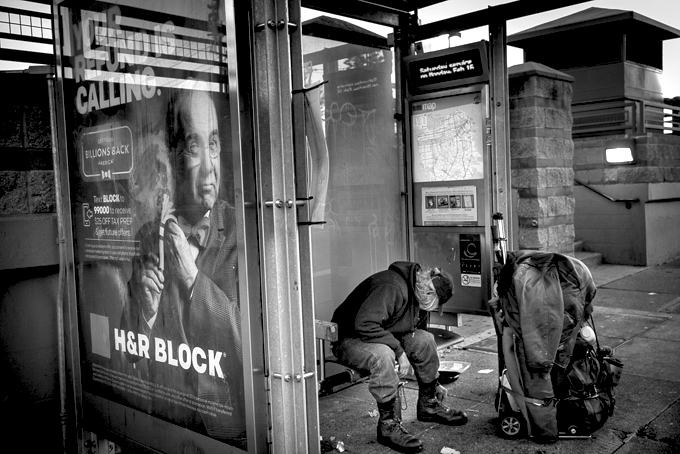Migration, homelessness, and a restive population
By Hardy Green

16th and Bryant, San Francisco, CA. USA. 12 Feb 2015 Photo: Robert Gumpert
Migration, homelessness, and a restive population—the U.S. is experiencing a doom loop of interrelated, overlapping events all involving shelter.
U.S. cities face a growing population of the unhoused, estimated nationally to be at a half-million, with New York and California particularly affected. At this moment, there are over 78,000 people in New York City’s shelter system.
There’s also a “housing shortage”—meaning an undersupply of residences in desirable places for those who can afford to buy or rent something, if not perhaps at market prices. The U.S.is short 3.8 million housing units to keep up with household formation, according to mortgage fund overseer Freddie Mac. The problem is no longer limited to the coasts, as supply has worsened in 47 states and the District of Columbia, according to research group Up For Growth. Last year, the national median asking price for a home was more than $400,000, according to Realtor.com.
Then there’s the “work-from-home” phenomenon: an increasing number of employed people no longer wish to commute five days a week, leading to an oversupply of office space in big cities and possible efforts to turn offices into residences.
Add to these the border crisis: record numbers of refugees are pressing to get into the USA, where they too will require housing. Columbians, Venezuelans, Brazilians, and others have been assaulted by economic and political upheaval. Millions of lives have been upended.
And now we’re seeing the emergence of new company towns. Facebook, Google, and Elon Musk’s Space X, Boring Co., and Tesla are all building new municipalities—developments for their employees, and not for anyone else. While Facebook and Google are situated in the overpopulated greater Bay Area, Musk has chosen to build in an undeveloped area of Texas—largely so that he can avoid paying taxes or otherwise contributing to social spending.
At bottom, we’re seeing a vanishing of the last vestiges of a social contract. Governments, hamstrung by right-wing movements and megabucks funders, no longer step in to fill the voids left by the shortcomings of the global market economy. Employers slash worker benefits, rearrange schedules wantonly, and squeeze every extra working minute out of their employees. Accordingly, people figure that life (especially during a pandemic) is short and layoffs can happen at any time—so why should anyone feel especially committed to a job? Even many capitalists are withdrawing from life-as-we-knew-it, placing their wealth in tax havens across the planet and their productive facilities in low-wage, undemocratic, little-regulated zones from Texas to Shenzhen. Billionaires are relocating themselves to gated communities, private islands, and yachts at sea.
This latter phenomenon is frighteningly described in Wellesley College professor Quinn Slobodan’s book Crack-Up Capitalism. He tells how the “bloom” of new nations—including those resulting from the break-up of the U.S.S.R.—was greeted as a windfall by capitalists. Each new state represented “a start-up territory that might offer itself as a refuge for flight capital or a site of unregulated business or research.”
Backed by a cadre of libertarian idealogues from Milton Friedman to Peter Thiel, a class of capitalists who never accepted even modest reform platforms such as FDR’s New Deal or LBJ’s Great Society drew inspiration from such regulation-free enclaves as Hong Kong and Singapore. “The great task for libertarians is to find an escape from politics in all its forms,” wrote Thiel. And this is the world they have created, says Slobodan: “The world of nations is riddled with zones,” he notes, from free ports and high-tech parks to city states, duty-free districts, and innovation hubs. There are over 5,400 such zones across the globe, represented in a bewildering variety of forms.
You might ask why Musk and Facebook have bothered creating throwback company towns. Surely the answer to all corporations’ problems is already out there in the form of the regulation- and tax-free zone. But maybe the skilled high-tech laborers required at Facebook, Tesla, and Space X don’t wish to move to such a zone. In time, they may have little choice.
…